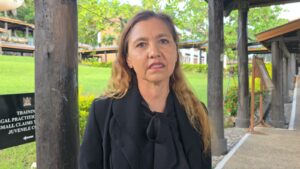Fiji’s Director of Mineral Resources, Apete Soro, highlighted that obtaining landowners’ consent is not required for issuing mining exploration licenses, whether new or renewed, as stipulated in the Mining Act 1965.
Nevertheless, he underscored that landowners retain rights to the land and must be notified for access.
Soro made these statements while addressing questions from the Fiji Parliament Standing Committee on Natural Resources regarding the challenges of balancing landowners’ interests with the objectives of wealth-creation through mining referencing concerns stemming from mining activities in the Namosi region.
“In the case of Namosi, this was mainly due to outstanding traditional differences within the landowning units. This has somehow affected the renewal of exploration licenses over the years,” Soro said during the Ministry of Lands and Mineral Resources presentation to the committee yesterday.
To improve communication and address such concerns, the ministry has established a community consultation unit tasked with updating landowners on proposed programs and ensuring compensation agreements are in place prior to exploration activities.
Soro also restated the difference between mineral exploration licenses and mining leases.
“Mineral exploration licence is not mining. It is a search for minerals which includes basic prospecting, such as picking samples, including advanced explorations such as digging pits, trenches, or drilling.”
Under exploration licenses, the rights to the land remain with the landowners, with companies only required to inform them of access for exploration purposes. However, with mining leases, landowners forfeit their rights, granting companies broader access for mining operations.
“The Mineral resources department has a process dictating the grant of renewal or exploration licences as required under the Mining Act 1965. Tenement holders are required to notify landowners of land access. However, a full consultation is conducted through a respected provincial office, which is also verified by the mining division’s community unit. Again, I’d like to emphasise on this with exploration licences the ministry or the department legally does not need consent. It only needs to advise the landowners, to inform the landowners that investor will be entering their land to conduct mineral explorations.
“If the investor disturbs the land [while] conducting mineral explorations, that investor needs to compensate the landowners for those disturbances. I think this is one of the main issues that is being misinterpreted with regard to how the department carries out its legislative role.
“There has been a move of Free Prior and Informed Consent. Legally under the Mining Act that approach is illegal to be instituted on on acquiring exploration licences. The legal requirements under the Mining Act, the mining companies only need to inform the landowners that they are entering. We would like to ask why. My thinking is that it’s because the mineral is owned by the state. The state has the legal right to enter or to access to extract and that is where the legislation rests as for now.”
Soro also mentioned ongoing reviews of the Mining Act, but noted that the legislation remains unchanged for the time being.
“The mining review is currently ongoing. Maybe that will be an issue that will be [considered] but as for now, that remains as is. Mineral exploration companies don’t necessarily need consent … to enter landowners’ land.”









